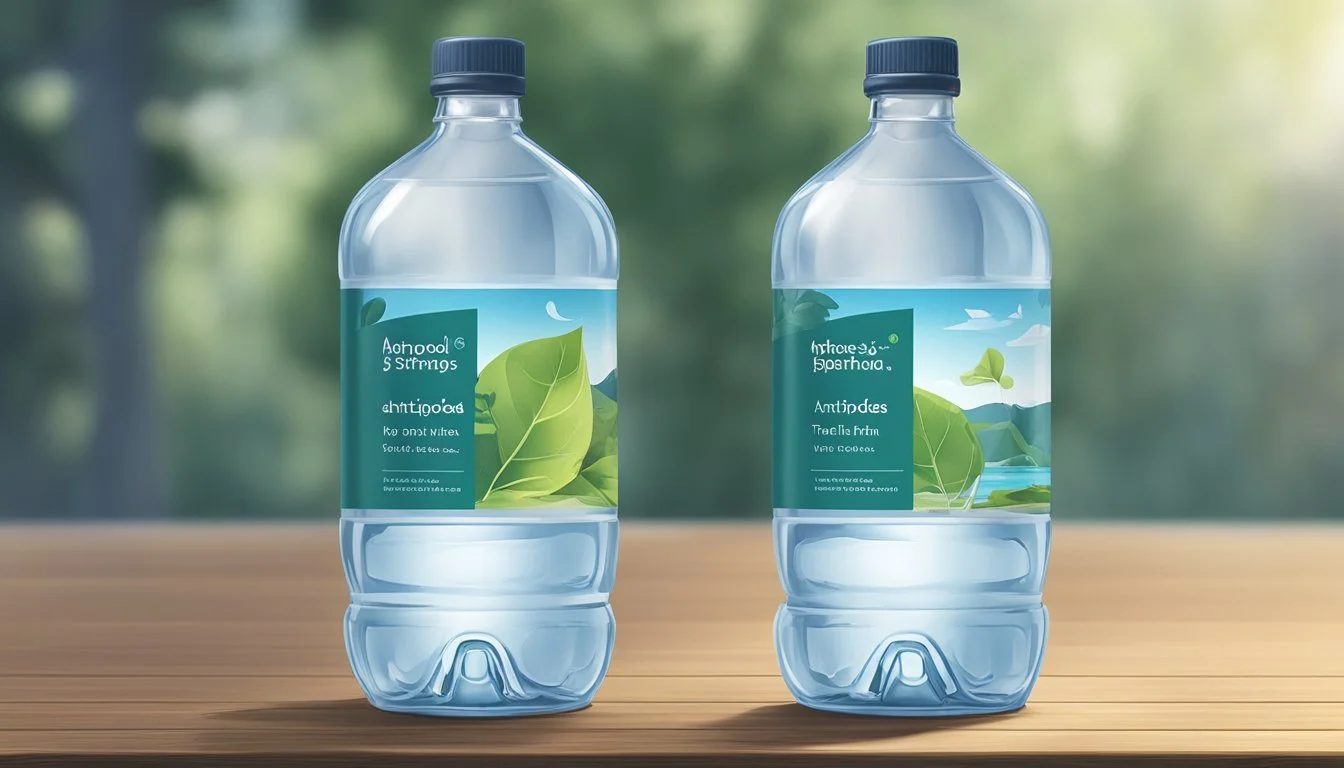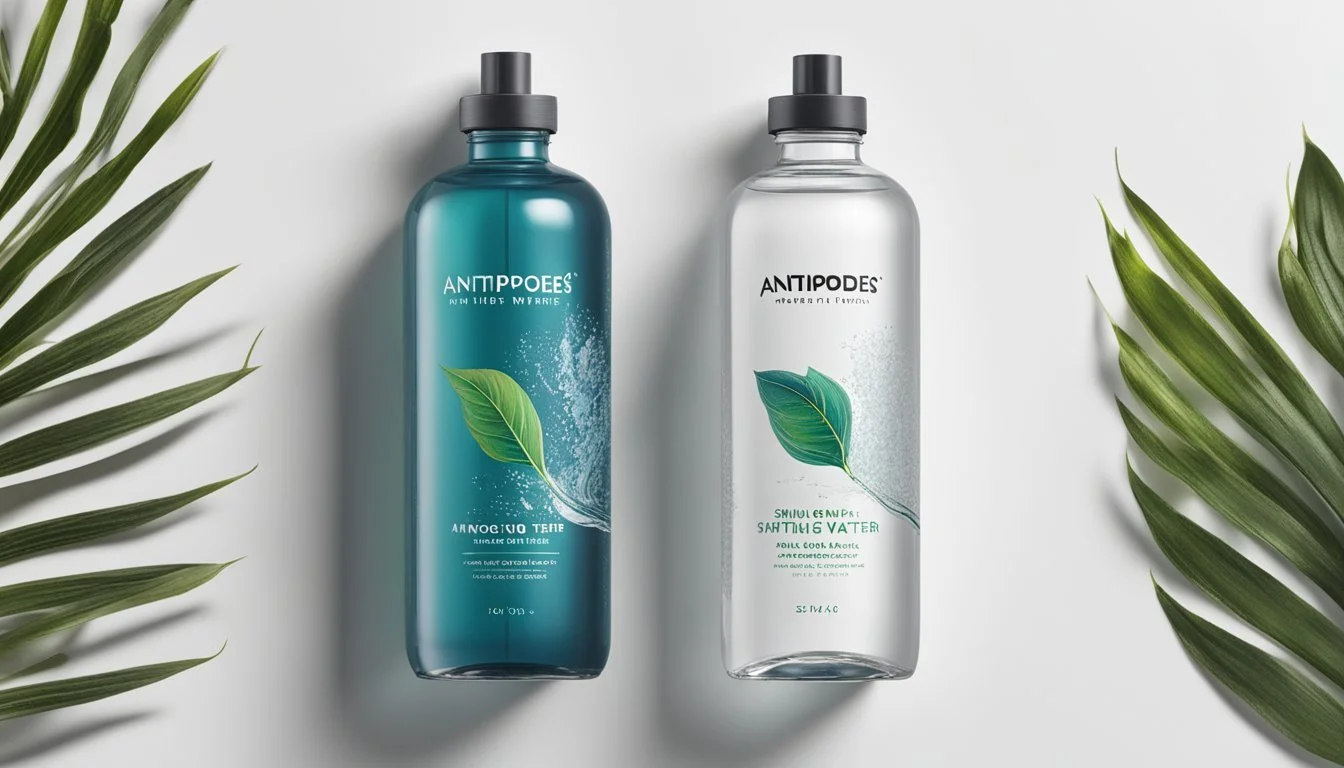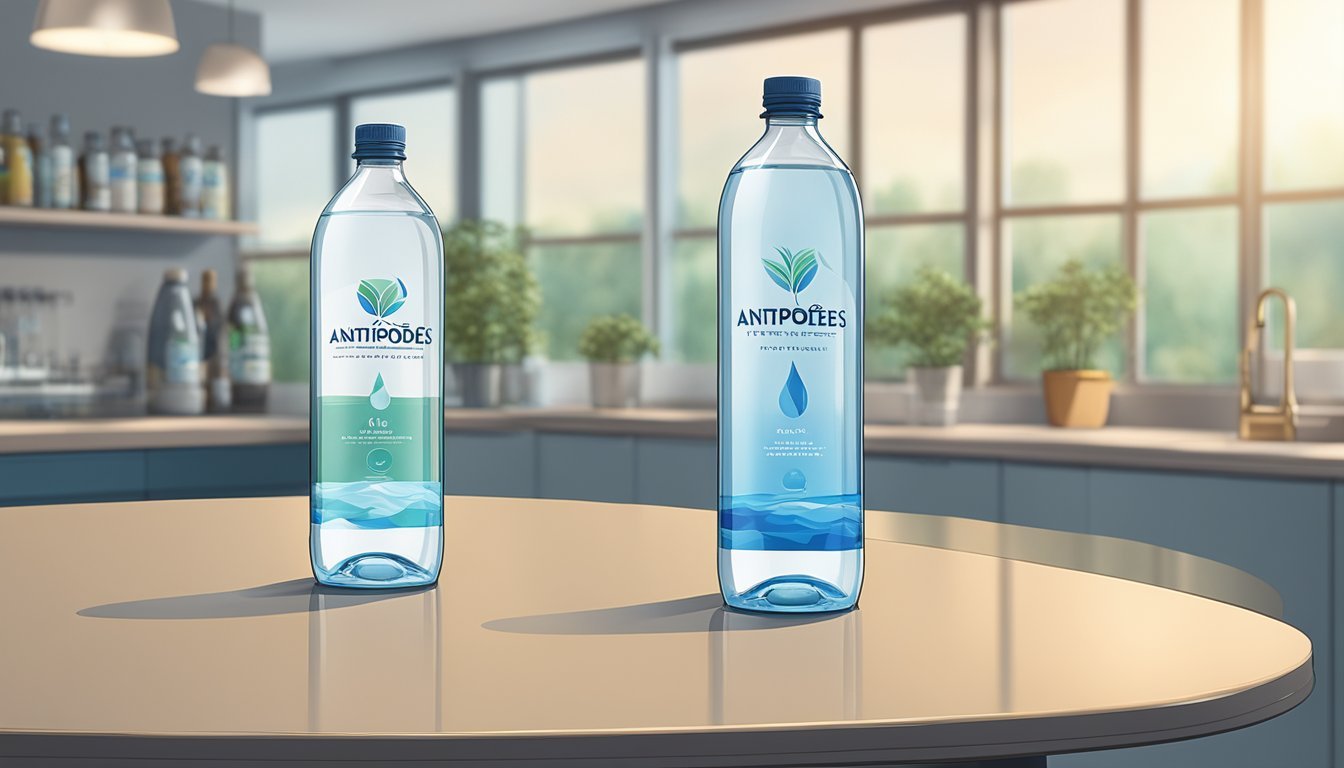Antipodes vs. Simple Truth
Comparing Quality and Taste
Choosing the best bottled water often boils down to personal preference and specific benefits. In the battle between Antipodes and Simple Truth, it’s essential to compare their unique qualities. Antipodes is praised for its pristine purity, sourced from deep within New Zealand's volcanic rock. This purity translates to a crisp, clean taste that many enthusiasts swear by.
On the other hand, Simple Truth offers artesian water with an alkaline pH level of 8. This higher pH can be beneficial for neutralizing acidity in the body, making it an attractive option for health-conscious individuals. Distributed by Kroger, Simple Truth is easily accessible and offers a refreshing taste without the tang of some other brands.
While Antipodes boasts unmatched purity and a refreshing taste from New Zealand's depths, Simple Truth's alkaline nature and accessibility make it a strong contender for those seeking everyday hydration with health benefits. As bottled water continues to be a staple in many households, understanding the distinct advantages of each brand can help consumers make an informed choice.
Understanding Bottled Water
In choosing the best bottled water, it’s essential to grasp the different types available, compare it with tap water, understand health implications, and be aware of its regulation standards.
Types of Bottled Water
Bottled water comes in various forms, each with unique characteristics. Natural spring water is sourced from underground springs and contains natural minerals. Artesian water is derived from a confined aquifer, which has pressure aiding its extraction to the surface. Alkaline water usually has a higher pH level and may include added minerals meant to impact bodily pH levels. Purified water undergoes rigorous filtration to remove impurities, making it an ideal choice for those seeking the purest drinking option.
Bottled vs. Tap Water
Choosing between bottled water and tap water can be influenced by several factors. Tap water is readily available and cost-effective, usually sourced locally and regulated rigorously at municipal levels. On the contrary, bottled water offers convenience and variety, though it often incurs significantly higher costs. Tap water in the United States costs about $0.005 per gallon, while bottled water can be as high as $9.47 per gallon when purchased in single-serving bottles. Consumers may also consider the environmental impact, as plastic bottles contribute to waste and resource use.
Health Implications of Water Choices
Health implications are crucial when deciding between different types of water. Both tap water and bottled water must meet safety standards, though the perception of purity can differ. Bottled water often includes fewer contaminants due to its purification processes, but tap water can also be quite safe if it adheres to EPA standards. Some bottled varieties, like alkaline water, claim additional health benefits related to pH balance, though these claims should be considered with scrutiny. It's vital to choose water that meets individual health needs without relying solely on marketing claims.
Regulation and Standards
The regulation and standards for bottled water differ from those for tap water. Bottled water is regulated by the FDA, while tap water falls under EPA jurisdiction. The International Bottled Water Association (IBWA) also sets stringent guidelines that bottled water companies often follow to ensure safety and quality. Despite thorough regulation, scrutiny of compliance and quality control in the industry remains essential. Consumers should look for certifications and adhere to choosing brands that follow regulatory standards diligently.
By understanding these aspects – types, comparisons, health impacts, and regulations – consumers can make informed choices about their bottled water preferences.
Analyzing Water Quality and Taste
When comparing Antipodes and Simple Truth bottled waters, it's essential to evaluate their taste, pH balance, and the influence of their sources.
Factors Influencing Water Taste
Taste is a primary factor in judging bottled water quality. Natural electrolytes, originating from the water source, contribute to flavor by adding subtle mineral notes. Antipodes is sourced from deep aquifers, providing a distinct mineral profile that many find crisp and invigorating. Simple Truth, with a higher pH level, tends to taste smoother and milder.
The mineral content is noticeable in Antipodes, enhancing its perceived freshness. Conversely, Simple Truth's artisanal quality may appeal to those preferring a less pronounced taste.
pH Balance and Water Quality
pH balance affects both taste and health benefits. Antipodes maintains a neutral to slightly alkaline pH, around 7.5 to 8.0, which some believe helps in maintaining body pH balance more effectively.
Simple Truth boasts a pH level of 8.0, categorizing it as alkaline water. Advocates suggest this can neutralize acidity in the body and provide a smoother taste. However, differences in pH between these two waters might not be significant enough to be a deciding factor for many consumers.
The Role of Source in Taste
The source of water profoundly impacts quality and taste. Antipodes is sourced from deep New Zealand aquifers, ensuring minimal contaminants and providing natural purity. This pristine source contributes to a clean, mineral-rich taste that's hard to replicate.
Simple Truth, on the other hand, is bottled at Crystal Falls Springs in Michigan. This source also provides clean water, but the surrounding mineral composition diverges from Antipodes, resulting in different flavor characteristics. The choice of either largely depends on personal taste preferences influenced by these natural characteristics.
Major Water Brands Comparison
When comparing major bottled water brands, it's essential to consider both the profile of leading brands and consumer perceptions. Each brand has unique attributes that influence its popularity and reputation.
Profile of Leading Water Brands
Fiji Water is sourced from a single aquifer in Fiji and naturally filtered through volcanic rock. It contains silica, calcium, and magnesium, contributing to a smooth taste.
Evian is sourced from the French Alps and is renowned for its mineral-rich content, providing a distinctive taste.
Dasani and Aquafina are purified water brands created by Coca-Cola and PepsiCo, respectively. They undergo rigorous purification processes to ensure purity.
Smartwater is known for its vapor-distilled water and added electrolytes for taste.
Essentia offers ionized alkaline water with a pH of 9.5, appealing to health-conscious consumers.
Core Hydration also provides pH-balanced water with added electrolytes similar to Smartwater.
Pure Life, Nestlé's brand, offers purified water with added minerals for taste but has faced scrutiny over sourcing practices.
Arrowhead, Deer Park, and Poland Spring are regional brands under Nestlé, known for their spring water sourced from specific locations.
Voss stands out with its artesian water and distinct glass bottles, while Icelandic Glacial is praised for its spring source in Iceland.
Acqua Panna from Tuscany is characterized by its smooth taste, and Crystal Geyser offers spring water with a focus on natural purity.
Consumer Perception of Brands
Fiji Water is often associated with premium quality and purity, making it a favorite among consumers who prioritize natural sources.
Evian enjoys a strong reputation for its consistent quality and mineral-rich content.
Dasani and Aquafina have mixed perceptions. While they are convenient and widely available, some question their value compared to natural spring waters.
Smartwater and Essentia are popular among fitness enthusiasts for their added electrolytes and health benefits.
Core Hydration appeals to those looking for pH-balanced options, fostering a loyal customer base.
Pure Life is perceived as an accessible and economical choice but faces challenges in public trust due to sourcing concerns.
Voss attracts consumers with its luxury image and visually appealing packaging.
Icelandic Glacial and Acqua Panna are praised for their natural origins and smooth tastes, enhancing their premium image.
Crystal Geyser, Arrowhead, Deer Park, and Poland Spring hold strong market positions as reliable sources of regional spring water.
Consumers have specific preferences based on taste, brand reputation, and perceived health benefits, shaping the competitive landscape of bottled water brands.
Investigating Antipodes and Simple Truth
Antipodes and Simple Truth are leading bottled water brands that differ significantly in their origins, ingredients, sources, and market positions. This analysis delves into their respective brand philosophies and the specific attributes that set each apart in the competitive bottled water industry.
Brand Origin and Philosophy
Antipodes originates from New Zealand, renowned for its pristine natural environment. The company emphasizes sustainability and environmental stewardship, ensuring minimal impact on the ecosystem. Their water is sourced from a deep artesian aquifer and bottled directly at the source, reinforcing their commitment to purity and quality.
Simple Truth, on the other hand, is a brand distributed by The Kroger Co., a major American retail company. Simple Truth focuses on providing organic and natural products that align with consumer demand for healthier, more sustainable choices. Their water products, such as Simple Truth Artesian and Vapor Distilled Electrolyte Bottled Water, cater to this demographic by prioritizing transparency in sourcing and ingredient quality.
Product Ingredients and Sources
Antipodes boasts a high-quality water profile, sourced from a deep aquifer in New Zealand. The natural filtration process through volcanic rock enhances the water's purity, making it exceptionally low in mineral content and free of contaminants. This results in a crisp, clean taste that appeals to discerning consumers.
Simple Truth offers a range of bottled water options, including artesian and purified waters with added electrolytes for taste. For instance, the Simple Truth Artesian Water has a pH level of 8, indicating its alkaline nature, which some consumers believe offers health benefits. The water is bottled at the source by Crystal Falls Springs in Michigan, ensuring consistency in quality and taste.
Market Presence and Consumer Trends
Antipodes has established a strong market presence, particularly in premium and international markets. Its branding as a luxury, environmentally-friendly product appeals to consumers who prioritize sustainability and superior water quality. The brand has also made significant inroads into upscale hospitality and dining establishments, enhancing its visibility and reputation.
Simple Truth, capitalizing on The Kroger Co.'s expansive retail network, enjoys wide availability across the United States. The brand's focus on natural and organic products resonates well with health-conscious consumers. Offerings like vapor distilled water with added electrolytes cater to a trend towards functional beverages, further solidifying its market position. Simple Truth's use of 100% recyclable aluminum bottles also highlights its commitment to environmental sustainability, appealing to eco-conscious buyers.
Environmental and Ethical Considerations
Both Antipodes and Simple Truth bottled waters have distinct environmental and ethical impacts. Evaluating these can help consumers make a more informed choice.
Impact of Bottled Water on the Environment
Bottled water production and disposal significantly impact the environment. Plastic bottles contribute to pollution and require fossil fuels for production. The bottles often end up in landfills and oceans, causing long-term ecological damage. For instance, bottles from both brands may accumulate in oceans, harming marine life and ecosystems.
The bottling process itself consumes considerable water resources, which can lead to water scarcity in regions where water is extracted. This extraction often depletes local water supplies, affecting the surrounding communities and ecosystems. Additionally, the transportation of bottled water adds to carbon emissions, contributing to global climate change.
The use of PFAS chemicals, heavy metals, and other contaminants like arsenic and lead in plastic bottling poses health risks and environmental hazards. Both Antipodes and Simple Truth need to comply with EPA regulations to ensure their operations minimize these harmful impacts.
Ethical Practices in Bottled Water Production
Ethical practices in bottled water production encompass several factors, including the sourcing of water, labor conditions, and corporate transparency. Antipodes emphasizes its commitment to sustainable practices by sourcing water from renewable resources and employing environmentally friendly bottling methods. They aim for minimal environmental disruption and adhere to strict water management practices.
On the other hand, Simple Truth also promotes ethical sourcing by ensuring that their water comes from protected sources. They strive to provide fair labor conditions and work to avoid corporate malfeasance by maintaining transparency about their sourcing and production processes.
Both brands must address issues related to contamination, such as mercury and other harmful substances, to uphold ethical standards in their production processes. Adhering to rigorous standards not only satisfies consumers' ethical concerns but also ensures compliance with environmental and health regulations.
Consumer Guidance
Choosing between Antipodes and Simple Truth bottled waters involves considering factors like quality, safety, and product transparency. This section provides practical advice on selecting the right water, understanding product labels, and insights from investigative reports.
How to Choose the Right Water
When selecting bottled water, consider factors such as taste, purity, and source. Consumers often prefer brands that offer natural spring water or mineral water, which are generally perceived as having higher quality.
Check if the brand undergoes regular testing for contaminants and adheres to FDA standards. Brands like Fiji Water boast natural groundwater sources, while others, including Coca-Cola's Dasani, may use municipal sources with additional filtration.
Carbonation also plays a role. Some consumers enjoy the refreshing fizz of carbonated water, but be aware that some carbonated waters may contain PFAS chemicals, as highlighted by Consumer Reports.
Understanding Product Labels
Reading and understanding product labels is crucial for making informed choices. Labels should clearly state the source of the water, such as natural spring or purified water.
Check for ingredients and any added minerals. Some brands add electrolytes for taste, which might appeal to those looking for enhanced hydration.
Certifications and testing details often add another layer of trust. The label should mention if the product complies with FDA regulations and if there are third-party verifications. For instance, some brands might display certifications from recognized bodies like the NSF.
Investigative Insights on Water Brands
Investigative journalism provides critical insights into bottled water safety and quality. Ryan Felton and Consumer Reports notably shed light on the presence of toxic substances like PFAS in various popular brands, especially carbonated ones.
Reports often reveal that even brands selling high-priced bottled waters might not be entirely free from contamination. Investigations underscore the importance of consumers cross-referencing claims made by manufacturers with independent reports.
To make safer choices, consumers should look out for brand reports and reviews. It's beneficial to refer to investigations and reviews for assessing the true quality and safety of bottled waters.
Closing Thoughts
When comparing Antipodes and Simple Truth, both offer unique benefits.
Antipodes, drawn from a New Zealand aquifer, is known for its simple, light flavor and subtle minerality. Its glass bottle design appeals to those looking for an aesthetically pleasing option, though it comes with a higher price tag.
Simple Truth stands out for its alkaline properties, with a pH level of 8. This makes it a good choice for those seeking health benefits associated with alkaline water.
Convenience is another factor. Simple Truth is distributed by The Kroger Co. and bottled at the source in Crystal Falls, Michigan, suggesting wide availability. Contact for more information is provided via their customer email support.
Aspect Antipodes Simple Truth Source New Zealand aquifer Crystal Falls, Michigan pH Level Neutral Alkaline (pH 8) Packaging Glass bottle Plastic bottle Availability Limited Widely available Price Higher Moderate
The bottom line is a matter of personal preference between premium quality and health-focused properties. Both brands aim to deliver the best water experience, catering to varied tastes and needs.





